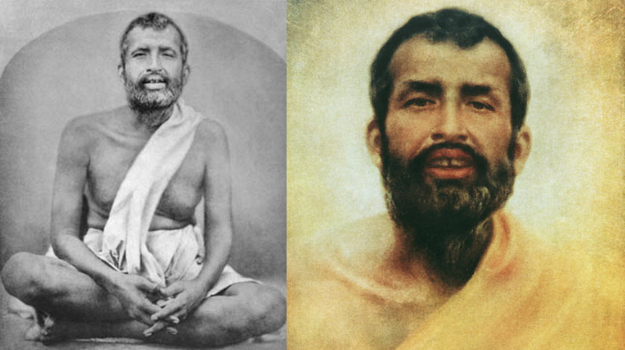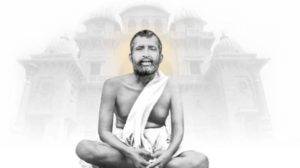In the previous post, we learnt from Swami Vivekananda that the best way to handle insults is to remain detached and to not react. In this way our mind stays established in inner peace and its conserved energies can then be directed towards attaining loftier goals.

– Sri Ramakrishna
Now the above teaching of Swamiji works well when we are dealing with sporadic, one-off instances of humiliation from those on the outside. Then it is possible to take the high road and be detached.
But there can be situations in life, when we find ourselves trapped in a hostile environment, where we face regular and constant bullying and harassment, such as at the school, office or even at home. At times this badgering can be so intense that we start to lose our mental balance.
In such situations should we still try to keep calm, not fight back and meekly acquiesce to the bully’s demands? Wouldn’t this be the right course of action, for we would be fully abiding by Swamiji’s teaching of “be detached and do not react”?
Not so! In fact in a majority of cases this actually would be a deeply wrong thing to do!
The reason for this is that Swamiji’s teaching of “be detached and do not react” is only applicable when we are already brave and courageous enough to stand up and tackle the bully. Then we can take the moral high ground and be perfectly detached. However, the teaching is not applicable when we find ourselves trembling before the bully out of fear, cowardice, timidity and weakness. (More on this later in the post.)
In the event that we find ourselves belonging to the second group, Sri Ramakrishna offers a way out through a most thought-provoking parable, which teaches us how to effectively deal with bullying and harassment:
A DEVOTEE: “Sir, if a wicked man is about to do (us) harm, or actually does so, should we keep quiet then?”
MASTER (SRI RAMAKRISHNA): “A man living in society should make a show of tamas (aggression, anger etc.) to protect himself from evil-minded people. But he should not harm anybody in anticipation of harm likely to be done him.”
“Listen to a story. Some cowherd boys used to tend their cows in a meadow where a terrible poisonous snake lived. Everyone was on the alert for fear of it.
One day a brahmachari was going along the meadow. The boys ran to him and said; ‘Revered sir, please don’t go that way. A venomous snake lives over there.’
‘What of it, my good children?’ said the brahmachari. ‘I am not afraid of the snake. I know some mantras.’ So saying, he continued on his way along the meadow. But the cowherd boys, being afraid, did not accompany him.
In the meantime the snake moved swiftly toward him with upraised hood. As soon as it came near, he recited a mantra, and the snake lay at his feet like an earthworm. The brahmachari said: ‘Look here. Why do you go about doing harm? Come, I will give you a holy word. By repeating it you will learn to love God. Ultimately you will realize Him and so get rid of your violent nature.’
Saying this, he taught the snake a holy word and initiated him into spiritual life. The snake bowed before the teacher and said, ‘Revered sir, how shall I practice spiritual discipline?’
‘Repeat that sacred word’, said the teacher, ‘and do no harm to anybody.’ As he was about to depart, the brahmachari said, ‘I shall see you again.’
Some days passed and the cowherd boys noticed that the snake would not bite. They threw stones at it. Still it showed no anger; it behaved as if it were an earthworm. One day one of the boys came close to it, caught it by the tail, and, whirling it round and round, dashed it again and again on the ground and threw it away. The snake vomited blood and became unconscious. It was stunned. It could not move. So, thinking it dead, the boys went their way.
Late at night the snake regained consciousness. Slowly and with great difficulty it dragged itself into its hole; its bones were broken and it could scarcely move. Many days passed. The snake became a mere skeleton covered with a skin.
Now and then, at night, it would come out in search of food. For fear of the boys it would not leave its hole during the day-time. Since receiving the sacred word from the teacher, it had given up doing harm to others. It maintained its life on dirt, leaves, or the fruit that dropped from the trees.
About a year later the brahmachari came that way again and asked after the snake. The cowherd boys told him that it was dead. But he couldn’t believe them. He knew that the snake would not die before attaining the fruit of the holy word with which it had been initiated.
He found his way to the place and, searching here and there, called it by the name he had given it. Hearing the teacher’s voice, it came out of its hole and bowed before him with great reverence. ‘How are you?’ asked the brahmachari. ‘I am well, sir’, replied the snake.
‘But’, the teacher asked, ‘why are you so thin?’ The snake replied: ‘Revered sir, you ordered me not to harm anybody. So I have been living only on leaves and fruit. Perhaps that has made me thinner.’
“The snake had developed the quality of sattva (purity and goodness); it could not be angry with anyone. It had totally forgotten that the cowherd boys had almost killed it.
“The brahmachari said: ‘It can’t be mere want of food that has reduced you to this state. There must be some other reason. Think a little.’
Then the snake remembered that the boys had dashed it against the ground. It said: ‘Yes, revered sir, now I remember. The boys one day dashed me violently against the ground. They are ignorant, after all. They didn’t realize what a great change had come over my mind. How could they know I wouldn’t bite or harm anyone?’
The brahmachari exclaimed: ‘What a shame! You are such a fool! You don’t know how to protect yourself. I asked you not to bite, but I didn’t forbid you to hiss. Why didn’t you scare them by hissing?'”
MASTER (SRI RAMAKRISHNA): “So you must hiss at wicked people. You must frighten them lest they should do you harm. But never inject your venom into them. One must not injure others.”
– Gospel of Sri Ramakrishna by “M”, Chapter 1: Master and Disciple
Lessons To Learn
From the above parable of Sri Ramakrishna two important lessons can be drawn:
#1 – Before We Attain To Perfect Forbearance, We Must First Learn To Be Strong & Stand Up For Ourselves
In the previous post how to deal with insults, Swami Vivekananda with his teaching of “be detached and do not react” was referring to the ideal of perfect forbearance, which we should all aim to develop within us.
Forbearance is defined as the ability to bear all hardships, illnesses, harassments, ups and downs – with a calm, dignified and unperturbed state of mind, without letting out the cries of self-pity, such as: “why me, why am I so unlucky, etc.”
(For more see Swami Yuktatmananda’s (of the Vedanta Center of New York) wonderful series of articles on Forbearance: Part 1, Part 2, Part 3 and Part 4.)
But we cannot hope to attain to this perfect forbearance, if in the face of bullying and harassment, we strive to be passive and unresponsive on the outside; while on the inside our mind is raging in turmoil – we are shaking with fear (like the snake who feared the boys and avoided them), we develop anxiety and panic attacks, we become full of hatred for the bully and often feel like running away from the world.
This kind of outer calmness is fake – it is simply a mask for inner weakness because the mind has lost its resilience, courage and strength.
When this happens to us, when our mind begins to lose its grit, and turns soft and mushy in the face of bullying, then we must first and foremost heed to Sri Ramakrishna’s teaching and learn to be fearless and stand up for ourselves (i.e. hiss at our opponents).
Only when we have been able to garner unshakable inner strength by successfully repelling our opponents, will our mind finally lose its cowardice and learn to be truly calm in the face of the greatest perils. Only then can we be in a position to live up to the ideal of perfect forbearance that Swami Vivekananda has taught.
Then even in the face of bullying and harassment we will still be able to remain perfectly unaffected, detached and peaceful inside (as well as outside), just like the great sage who laughed in the face of the Emperor Alexander, when the king threatened to kill him (read the story here).
“Before reaching the highest ideal, man’s duty is to resist evil. Let him work, let him fight; let him strike straight from the shoulder. Then only, when he has gained the power to resist, will non-resistance (no reaction and calmness) be a virtue.”
(Otherwise at all points before attaining to this state, non-resistance and meekly giving in is pure cowardice.)
– Swami Vivekananda, Complete Works – Volume 1
#2 – “Hiss” to Scare Your Oppressors, But Do Not Swallow the Poison Yourself
So far we have learnt that when faced with evil minded people who enjoy harassing us, we must not be timid or scared (like the snake in the parable), but we must learn to stand up for ourselves and not allow others to treat us badly.
As Sri Ramakrishna has said, we can do this by making an outer pretense of anger (a show of tamas), making it amply clear that we are not ones to be bullied easily.
At the same time, we must keep in mind that this show of anger must only be an ACT (just like an actor in a movie), and we must NOT internalize these outer feelings of animosity by letting them get established in our mind. In other words, we must not swallow the poison ourselves.
Many times after we get angry with people, we spend the next few hours or even days keeping the incident alive in our minds, by constantly thinking about it, raking over and over again in our thoughts the numerous evil qualities of the aggressor.
However, by constantly dwelling upon the bad qualities of another, we run the risk of letting these very blemishes becoming established in our own inner nature.
Therefore we must guard against this. Just like an actor, who after doing a terrible fight scene, forgets his anger, packs up and goes home calmly and peaceful, we too, once the situation is resolved, must delete the incident from our mind, forgive and forget and bear no ill-will towards the oppressor.
In this way by putting up only an outer show of tamas, we can still keep our inner mind unperturbed and peaceful and at the same time develop within us the qualities of courage, fearlessness and righteousness, and thus progress towards attaining to the ideal of perfect forbearance.
If You Liked this Post, I Also Recommend Reading:
- Part 1: How to Deal With Insults and Slander? – When someone insults us or spreads malicious rumors about us, how should we respond? Return insult for insult? The profound answer from Vivekananda!
- Part 3: How to See God in Those You Don’t Like? Teachings of Sri Ramakrishna – How to tolerate those whom we hate? How to destroy the pride and egoism, which makes us feel superior to others? Answer from Ramakrishna Paramahamsa.
- Part 4: Though God Dwells in All, Wicked People Must Be Avoided – Sri Ramakrishna’s Advice to Sadhaks – Recognize Divinity in all, but do not mix with bad people. Maintain your distance and avoid their company.
- Part 5: Suppose People Speak Ill Behind Your Back, How Should You Behave? – How should sadhaks treat those who dislike them and wish to cause them harm? Advice Sri Ramakrishna gave to Swami Vivekananda.
- Part 6: True Devotee Should Be Calm and Undisturbed by the Bad Opinions of Others – Wicked people may say bad things about you and blame you; but if you love God, you should endure with patience – Sri Ramakrishna’s advice to sadhaks.








